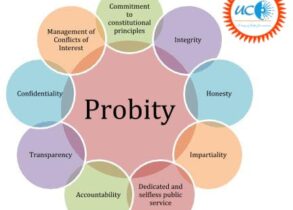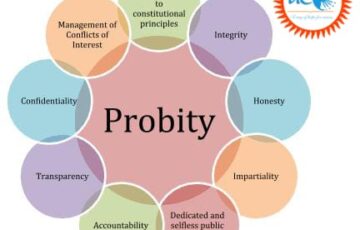Corruption
Q. Corruption distorts not only the functioning of the Government in India but business and corporate activities as well. Explain and discuss how the state can effectively deal with the deficit of ethics in the private sector.
Corruption is illegal gratification extracted by a person in some positions of power and influence for providing either the due Service or facility which is well within the entitlement of such persons or to obtain an out of turn favour or a decision by inducements of various types from a service provider –
Government or a corporate office or a registered society. Corruption is thus, the price one charges for exercise of conferred responsibility. The price may be in form of any benefit- monetary or otherwise. The exercise of power may or may not involve illegality. The range of activities with scope of corruption is
quite wide. Generally corruption is discussed in the context of government, i.e. state’s dealings within itself (such as recommending for promotion) or state’s dealing with private citizens or institutions (such as approving a real estate project). However, corruption is very much a part of private sector as well wherever the element of exercise of power comes. Especially with the involvement of private sector in providing public services, this element has increased.
There are various ways in corruption manifests in private activities. Cartelisation and price manipulation in market, creating artificial shortages, insider trading, use of entrusted power and resources for personal gain (such as ICICI bank using public money for giving loans without proper checks), auditors not revealing fraud in financial books of the companies, etc. Even though many of these activities are regulated or prohibited under the law, they are often bypassed using creative means. As such, in order to address this issue both strong laws and regulatory bodies as well as strong ethical principles are required.
Although we have statutory framework to deal with corruption in public sector, but there is a void to deal with corruption by the private sector. Corruption in the private sector does not come under the purview of the Prevention of Corruption Act. However, if the private sector (or any person engaged by them) is involved in bribing any public authority then he/she is liable to be punished for the offence of abetment of bribery after recent amendments to Prevention of Corruption Act, 1988.
Measures needed to bring ethics in private sector
- Many Non-Governmental Organizations receive substantial aid from government and spend public money, it would be desirable that persons engaged by such organizations be subjected to same scrutiny and levels of accountability as public servants.
- Promoting the development of standards and procedures to safeguard the integrity of relevant
private entities, including codes of conduct. The professional bodies such as the Bar, Medical Council, ICAI, etc. must make provisions for upholding the professional ethics by their members.
- Enhance accounting and auditing standards in the private sector and, where appropriate, provide effective, proportionate and dissuasive civil, administrative or criminal penalties for failure to comply with such measures.
- Create vigilance cells in private entities also, providing public services, on the lines of vigilance cells in public departments. This must be accompanied by the adequate grievance redressal system.For financial frauds in the corporate world there is a need to provide for a more concerted approach, perhaps by further strengthening and augmenting the capabilities of multi-disciplinary Serious Fraud investigation Office (SFIO).
- The extension of the PCA to the private sector should be comprehensive by amendment of the Companies Act to stop dishonest practices like over billing by private hospitals taking advantage of the customers weak position etc which should be a criminal offence and punishable.
It is necessary to have sound legal framework to deal with corruption in private sector, and at the same time, there is an urgent need to inculcate the values of probity and integrity among the business students.





